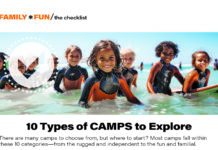The staggering statistics are game-changing for anyone involved in children’s food service: Nearly 6 million American kids — about 8 percent — have food allergies, according to the Centers for Disease Control and Prevention. For every 10 kids with food allergies, four may have severe allergic reactions requiring medical care.
At day and overnight camps, where directors and chefs are charged with ensuring the health and safety of hundreds of kids each summer, the rise in food allergies means ever-evolving diligence in the kitchen, as well as vigilant communication between staff, parents and sometimes physicians. Many camps now engage a registered dietitian or nutritionist to help them navigate the needs of children with lactose intolerance, vegetarian diets or allergies to gluten, nuts, MSG or chocolate.
“Meeting dietary needs at camp is a challenge that gets more complicated all the time,” says Barbara Dohner, owner and director of Camp Oneka, a 100-plus-year-old residential camp in the Poconos for girls 7 to 16. “Among our 100 campers and 40 staff members, some have gluten and lactose allergies, some are just gluten-free, some can have no lactose, some just can’t drink milk. Our small size allows us to keep track of campers, and Nancy, our cook, will make little batches of foods to fit individual campers’ requirements.”
Camp-parent communication is key
Beth Schwartzman, RD, LDN, CDE, created Healthy-Camper.com to help preserve the value of a camp experience for kids who require dietary care. An expert in camp menu management, medical nutrition, specialty diets and staff training, Schwartzman believes children with food allergies can attend camp safely when parents ask the right questions and camp directors are well informed.
“Communication is the biggest piece of this,” says Schwartzman. “Talk to the camp director and ask questions about what is served. Don’t forget to ask about all food and beverages — including snacks or ‘canteen.’ Do they put out water at each meal or is ‘bug juice’ the main drink? Is nonfat milk used? Be sure to visit the camp and see what they offer on a regular day.”
“We have seen a rise in the prevalence of food allergies to eggs, dairy, nuts and fruit, as well as more campers with special dietary needs, such as gluten-free,” says Susan Ansul, director of Ramah Day Camp in Elkins Park, PA, who last summer consulted with Schwartzman for more menu-planning assistance.
Willow Grove Day Camp in Willow Grove, PA, also uses a nutrition specialist to help develop menus and keep camp owner and director Howie Zeitz and his staff informed about campers’ individual dietary needs. Zeitz agrees that the number of campers identified with food allergies in recent years is much higher than in past seasons. “Parents with concerns are put in touch with our food service director and the child’s counselor, and an individual program is developed. We constantly stay in touch,” says Zeitz.
Help plan your child's camp menu
 When children have food issues, Dohner encourages parents to provide a written list of “dos and don’ts” and arranges for them to meet with chef Nancy when they bring their daughters to camp. “Many parents bring a stockpile of snacks and alternatives to our regular menu,” she says. “We also have a health foods store nearby that has been very helpful with gluten-free foods.
When children have food issues, Dohner encourages parents to provide a written list of “dos and don’ts” and arranges for them to meet with chef Nancy when they bring their daughters to camp. “Many parents bring a stockpile of snacks and alternatives to our regular menu,” she says. “We also have a health foods store nearby that has been very helpful with gluten-free foods.
“Our meals are served family-style, so campers can go into the kitchen to get their alternative entrée or their own food. Whenever we have girls with total peanut allergies, we take all peanut products out of our store and off our menus.”
Ramah is now also “nut-aware” — providing nut-free foods and snacks and replacing peanut butter with other products. “We work on creating a healthy camp menu, with increased sensitivity to camper’s dietary needs,” Ansul says. “Over the past several years, we have adapted our menu with healthier selections, such as daily fresh vegetables and fruits. We are also more aware of ingredients, read labels cautiously, and inquire further with manufacturers if product labels are unclear. Parents receive a copy of our lunch menu prior to camp to help coordinate special dietary needs.”
ACA awareness grows
Recognizing that camp directors must increasingly assure parents’ confidence about their ability to manage special diets safely, the American Camp Association has added healthy eating and nutrition planning to its list of core competencies for camp professionals.
“Good communication and planning are key,” Ansul says. “We work in partnership with our parents to provide the best camp program and experience for their children.”
Ellen Warren writes for the American Camp Association (ACA) Keystone Field Office serving Pennsylvania and Delaware camps and families. Learn more at Campparents.org.






